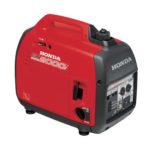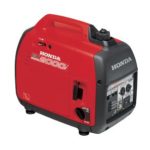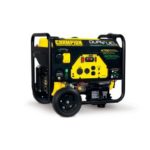When it comes to dealing with noisy generators, there are several ways you can go about trying to reduce the noise. Some methods are better than others, and some will cost more than others.
It may be that your existing generator is already quieter than it could ever be since manufacturers do their best to reduce noise levels before a unit heads for the market.
In the end, however, all you can do is try different things until something works for you.
1. Location of the Generator
Install the generator as far away from buildings as possible.
To reduce noise pollution caused by these machines, they should not be placed under windows in a house or inside garages where people work on vehicles because vibration noises can easily travel through walls and structures, transmitting this amplified sound into nearby living spaces such as bedrooms or kitchens.
If you must site a generator next to your home, use it sparingly for emergency power needs only and never run more than one machine at any given time.
It is also recommended that generators running in such proximity to homes be located in an area that is electrically isolated from power lines running into your residence, like a concrete pad or, if possible, inside a garage.
2. Check Other Devices Around the Generator
It’s quite common to have someone complain about engine or generator noise and not realize that the problem is neither of these items. Rather, it stems from improper installation, bad fuel, low oil condition, or other factors.
For example, suppose your generator is too close to an outdoor air conditioner, water pump, or mechanical device. In that case, it won’t be long before you notice that the generator and everything around it is making more noise than usual.
Before you contact a technician or your dealer about engine troubles, see what’s happening in your shed.
3. Lower the Generator’s RPM
Generator noise can be reduced by lowering the RPM of its engine when sound levels become excessive, especially for those who live close to their neighbors or are located near dwellings where people are trying to sleep during daylight hours.
Using lower-than-standard RPM settings will allow homeowners to reduce their chance of complaints from angry neighbors. It may also help prolong generator motor life and fuel efficiency if you do not give yourself more than is required (i.e., extra noise) just because you can!
4. Check the Generator’s Condition
When a generator goes bad, it’s usually because of wear and tear or damage caused by poor handling when moving the unit from place to place. Other problems can occur if fuel levels are too low, water gets into the carburetor (dirt also causes this), valves get gummed with carbon deposits, spark plugs go dirty, or oil becomes contaminated.
If you have a gas-powered generator that allows you to drain the tank, remove any water that might be there before adding fuel for the next time the unit will be used.
Remember to follow your owner’s manual instructions about adding fuel, oil, and water.
If too much oil is in the crankcase, air bubbles will develop in the fuel lines and eventually cause a noisy situation.
The fuel supply lines should be clean and free of debris or water. Make sure there are no restrictions in the hose connections, as this can also cause noise.
The first thing you can do to reduce noise from a gas-powered generator is to ensure that it runs smoothly and produces enough electricity for the task at hand. If there are mechanical issues such as these, noise is usually high on the list of troubles.
It also means keeping the air filter clean, changing spark plugs when necessary, ensuring valves are lubricated properly, and checking the oil level since overheating causes excessive noise.
5. Add Soundproofing
A good way to reduce generator motor sounds is by adding some barrier or shield designed with dampening attributes for reducing high amounts of ambient noise between rooms or areas where people sleep, work, eat or study.
Fit an enclosure around the generator that will isolate its loudest parts from those areas where people live and rest in your home (most importantly, bedrooms). This can be done using common products available at most hardware stores, like sheets of foam board insulation commonly used in garages and workshops.
The cheapest way to quiet a generator is by simply adding foam covers over all machines’ outlets and placing insulation around spark plugs, mufflers, and other high noise-producing components on the unit.
If you plan to use generators in more remote areas of your home, make sure these units are mounted on skids so they can be moved easily, if necessary, for storage during winter.
This material is not expensive but can dramatically reduce the noise levels from a generator by absorbing sound waves before they become airborne.
Make sure to fit weather stripping around doors leading into your generator room and tightly fitting windows to prevent air leaks, allowing noise pollution to enter other parts of your home.
6. Replace Your Generator’s Mufflers
A muffler can be fitted onto the exhaust pipe of a generator unit to reduce noise pollution associated with high decibel levels produced when start-up procedures are utilized.
The muffler must fit tightly to the exhaust pipe and be properly vented and cooled with powerful fans.
In cold-weather areas of the United States, you may want to consider using a muffler system that incorporates carbon dioxide or dry ice into its design to reduce noise pollution in homes located near areas where snowfall is common (generators must be operated indoors or within an enclosure when used during cold weather periods).
Qualified technicians usually install these units. They will cost a few hundred dollars to install, but they are well worth the price if you have neighbors who find your generator to be more of a nuisance than an asset during power loss.
Related: Best Inverter Generators
Conclusion
When it comes to generators, there are many things you can do to help reduce the noise. Some methods will be more expensive, and some may not make much difference, while other solutions might make your generator quieter.
It could also be that your existing unit is already as quiet as possible, so try these tips before buying a new one. If you’re still unsatisfied with how noisy or loud your generator is after trying all these different techniques, look at our article on the best quiet generators.



